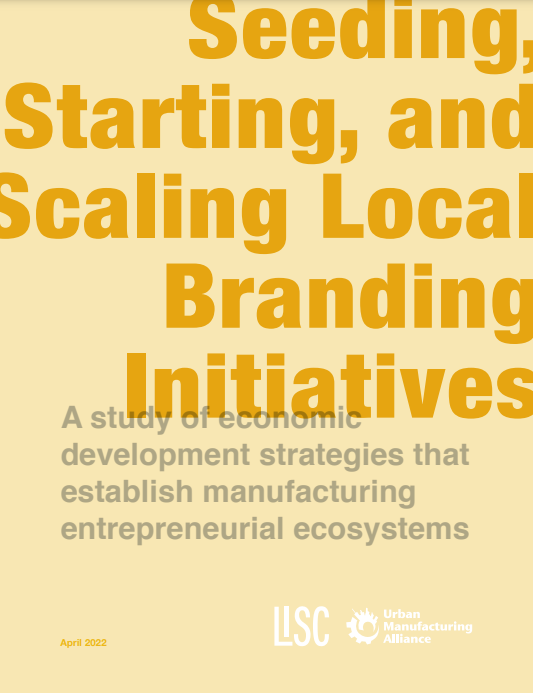Seeding, Starting, and Scaling Local Branding Initiatives
A study of economic development strategies that establish manufacturing entrepreneurial ecosystems.
Executive Summary
Manufacturing is an important part of a vibrant community, bringing innovation, creativity, and stability to cities. Economic development leaders often struggle to understand the relevance of manufacturing in urban centers and regional economies because manufacturing is believed to be dirty, dangerous, loud, and mindless work done in large facilities on the outskirts of cities. But over the past decade, small batch manufacturing - often performed within urban areas - has evolved. This evolution is in large part due to changing markets, technologies, and ownership demographics. We now see new models of manufacturing, bringing with them higher paying jobs and career pathways, which help a region’s economy become more diverse, resilient, and sustainable before and during major disruptions.
The Urban Manufacturing Alliance (UMA) has found that an impactful way to help urban manufacturing business owners and their current and future workforce is by supporting Local Branding Initiatives (LBIs), also known as “made-in” programs. An LBI is a pioneering approach to economic development which creates an ecosystem of stakeholders that support business owners in order to:
- Increase the number of manufacturing businesses
- Scale up existing manufacturing businesses
The ecosystem created by LBIs responds to the unique needs and qualities of the manufacturers in the region, in order to increase diversity and generational wealth, and to establish a resilient regional economy.
No two cities, manufacturing ecosystems, or LBIs are the same; however, when UMA studies LBIs across the country, we see consistent impacts, including helping manufacturers: access new markets and increase sales creating new jobs; connect training programs with manufacturers creating new workforce pipelines; and increase access to capital for women and business owners of color, all creating new economic pathways. LBIs promote womenand BIPOC-owned companies, emphasize the importance of both place and making, and educate consumers and leaders about the benefits of buying locally-made products. During the COVID-19 pandemic, LBI’s are helping local governments respond to PPE requirements, creating safe standards for reopening, managing grants and loan programs to help small businesses pivot and stay open, and disseminating information to businesses. Underlying all LBIs, both before and during the pandemic, is a belief that equitable economies are vital to the economic sustainability of cities. The outcome of their work is an interconnected regional economy of stakeholders reflective of their locale.
The Urban Manufacturing Alliance is proud of our work with and support of LBIs across the country. UMA was concepted by leaders of SFMade and Made in NYC and their work is foundational to our work today. Since 2016, UMA has hosted community of practice meetings, bringing together leaders of LBIs to share their experiences, identify best practices, and find ways to increase impact. Through these meetings and collaborations UMA has developed toolkits, policy briefs, and research supporting the importance of LBIs, these documents can be found in the further reading section. The following report builds on this work and provides additional background into the history and importance of manufacturing and details on the benefits of Local Branding Initiatives and how they can be created and supported.
